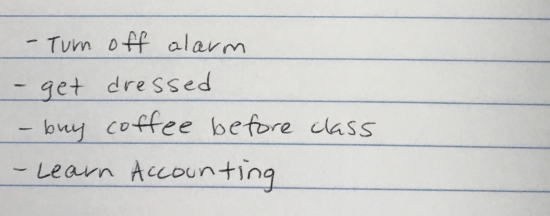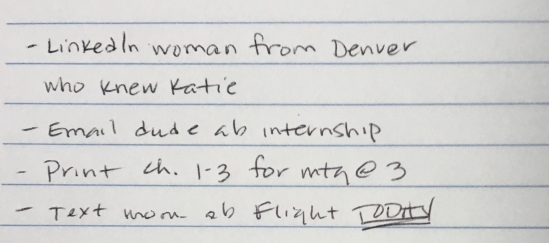
 By Siena Hickey T'18
By Siena Hickey T'18Siena is a first-year student at Tuck who will definitely let you know she’s from Texas but definitely hasn’t lived there in 10 years. Before Tuck she worked in South Africa developing strategies to connect qualified volunteers with worthwhile projects across developing markets as Global Insights Manager for Projects Abroad. At Tuck she is an active member of the Marketing and Brand Management Club, Tuck Africa Club, and trains with the Dartmouth Powerlifting Team. Siena loves talking about consumers, fitness, and macronutrients.
This is certainly not a discipline I’ve mastered, but it’s a nice idea! We aimlessly check our email dozens of times a day with no regard for the time wasted looking at—and then considering what to do about—emails we won’t ACTUALLY address until some later point. We do this to feel productive.
Being busy and being productive are not the same thing. In reality, this is just new information crowding out the stuff from before it entered your consciousness. It helps to bucket emails into two discrete categories:
Category 1: React now and move along. These emails take less than two minutes. You can bust through 10 in one sitting and respond without repliers remorse.
Category 2: Unread-ify and follow-up. I’m pretty sure I made up this term, but “unread-ifiable” emails are the ones that need some extra TLC; a little research or fact checking, perhaps a few intermediary ‘react now and move alongs’ to get a proper response in order. I always make sure these look “unread” in my inbox, so that I’ll come back to them later (Outlook’s little red flag and Gmail’s little golden star just don’t cut it).
Try this: morning, mid-morning, after lunch, mid-afternoon, and end of day. The pithy “6/12/6” rule is a great idea in theory, but in practice the 5-checks-a-day method is more realistic for MBAs. We’re trying to gracefully juggle group assignments and recruiting ‘thank yous’ and office hours and time sensitive executive lunch sign ups. And besides, it looks super cool to hastily check your email between classes. It lets people know how important you are.
sensitive executive lunch sign ups. And besides, it looks super cool to hastily check your email between classes. It lets people know how important you are.
Effective time management is a critical component of business school. Whether you decide to prioritize course work, recruiting, or extracurricular leadership, there are more than enough activities competing for your time and attention.
Who’s carrying the Cowboys this season? What craze will succeed the cronut? What did North West wear to her fourth birthday party? Getting around to these pressing topics is going to take you longer than it used to once you’re at business school, and “hanging out” becomes a new item on your Outlook calendar.
A two-second mirror snap of your groggy morning face, a time-stamped library selfie, or a short video of your study group’s lively debate over Anita Roddick’s role in the genesis of ethical consumerism are just a handful of ways you can prove your existence without inundating your calendar.
You press the home button, type in your password (mine is “1,1,1,1”) and your screen unlocks. There’s a small red circle sitting in the upper right corner of your Facebook icon. This thing can’t be more than half a centimeter in width, but your brain bursts with a hit of dopamine and you cannot wait to see who took their very own thumb and with their very precious time made the very small gesture of acknowledging your content.
Ok now multiply this finger tango by 100, which is around the number of times per day you open your phone, and consider how much time we waste getting sucked into the abyss of social media.
Save yourself. I beg of you. URL and app blockers (like Self Control, Focus Booster, and Freedom) are a great place to start. You’ll stockpile HOURS of time for other (only slightly) more important activities like stats homework, presentation practice, and networking events.
We'd like to think menial tasks aren’t worth writing down. I mean look at us—we’re about to be MBAs! We’re here because we convinced admissions committees all around the country that we have promising leadership qualities, fascinating professional interests, and inspiring time management skills. We know how to prepare Cash Flow statements and discuss the merits of divisional organizational structures. Why should I have to remind myself of something as trivial as googling “why do they call it tripod”? That’s exactly why.
By writing things down we become less occupied by them. This reduced cognitive effort brings a surprising amount of clarity and decreased stress to the high-ticket items. When you tease out the small things from your working memory, you free up mental RAM for the more important or challenging material on your agenda (if you’re like me, calculating Future Cash Flows is both “important” AND “challenging”).
There is obviously a right way and a wrong way to do this.
THE WRONG WAY

THE RIGHT WAY

But seriously, write it down.
Lay your clothes out for yourself, pack your lunch, and write out tomorrow’s agenda.
Before heading to sleep at whatever hilarious hour you’ve chosen to stay up until, make sure you close out of your browser tabs. Doing this reduces morning confusion over whether to start by reviewing your homework or reading that next chapter or checking LinkedIn. You’ll get to everything, but save yourself the trouble of fumbling over where to begin. Be disciplined enough to respect the time you allot for each, and begin the day with a fresh digital slate.